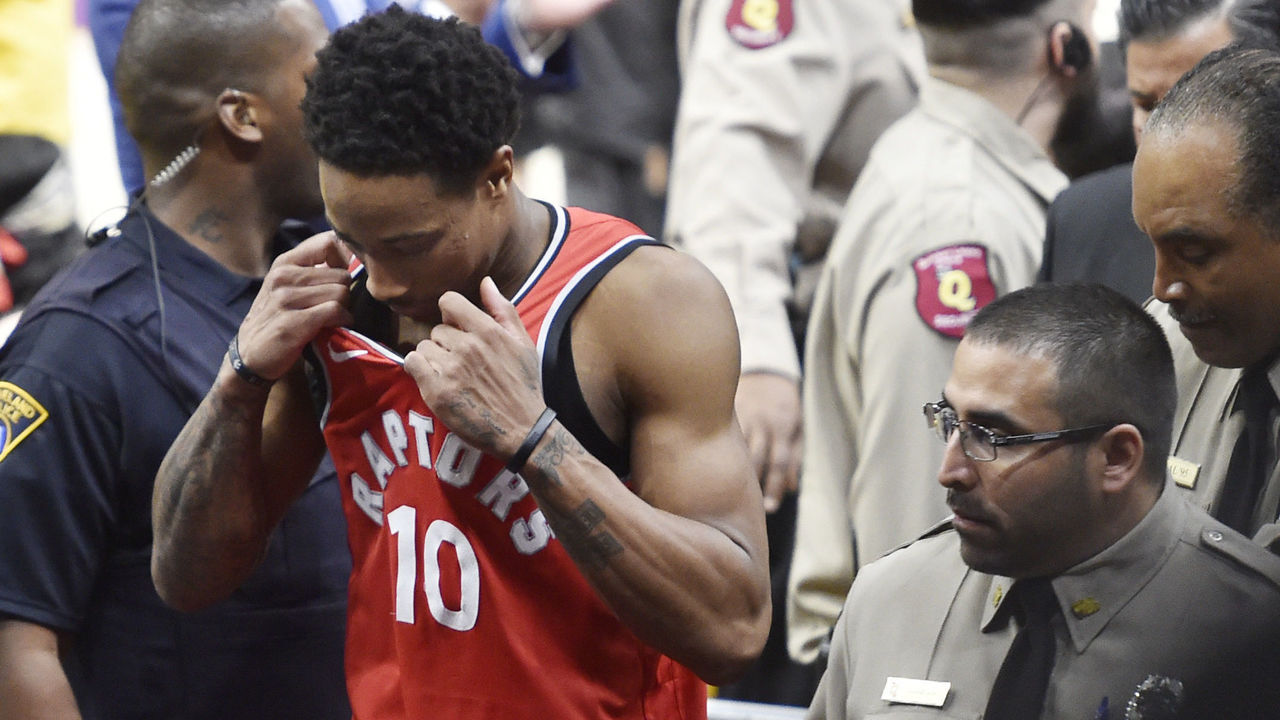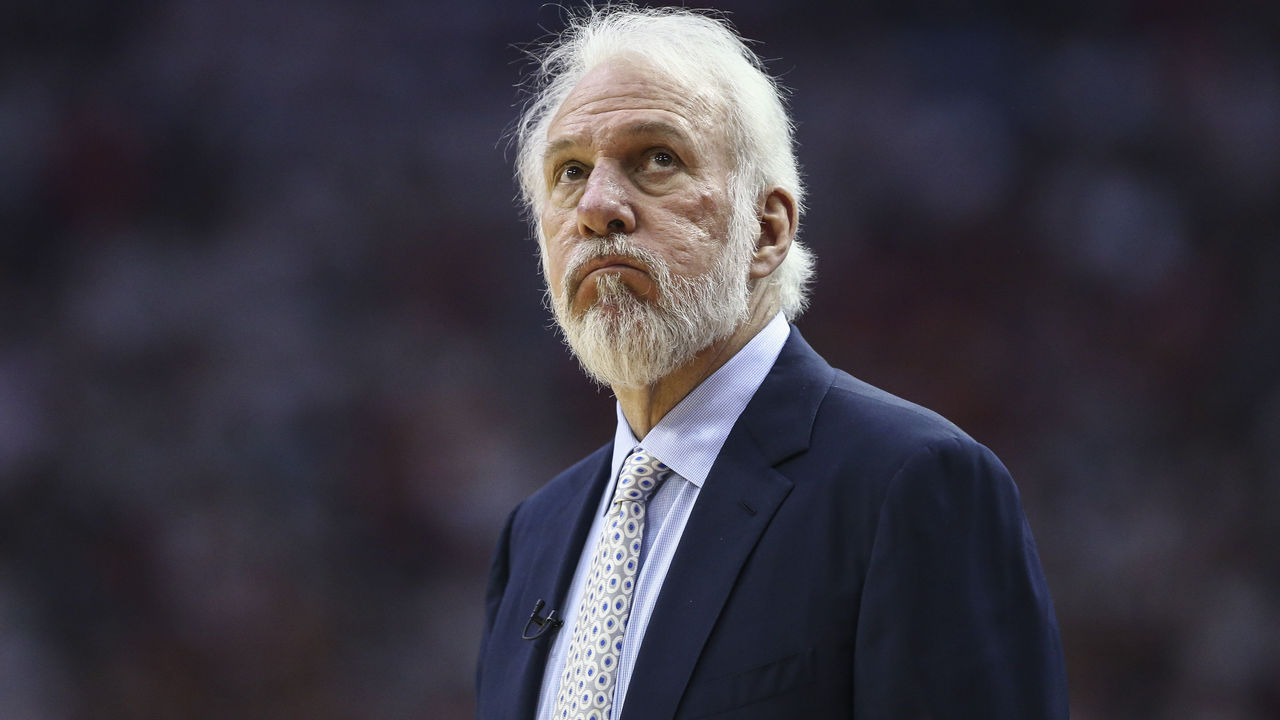Making sense of the Raptors-Spurs blockbuster
The Toronto Raptors and San Antonio Spurs completed a massive deal Wednesday morning, swapping a couple of All-NBA talents in the process.
Let's make sense of the transaction.
A no-brainer for Toronto
The risks associated with acquiring Kawhi Leonard - a disgruntled star who has yet to prove his health - are real, but opportunities to land a legitimate superstar of Leonard's caliber, let alone for such a middling package, don't come around often. Masai Ujiri and his team were right to pounce and seize the moment.
Under Ujiri's leadership, the Raptors have risen from the ashes of perennial dysfunction and irrelevance to become a model franchise. Over the last five years, Toronto averaged better than 52 wins. Over the last three seasons, the Raptors won more regular-season games (166) than any team outside Golden State and San Antonio, and only the Warriors and Cavaliers won more playoff series during that time.
Ujiri, who spent time with Barack Obama while supporting a sports and education facility in Kenya earlier this week, should have confidence betting on himself to sell Leonard long term, just as he did a disgruntled Kyle Lowry five years ago.
No matter how much bluster comes from Leonard's camp - and there will be plenty - the fact remains that a pending free agent (Leonard has a player option for the 2019-20 season) with the ability to cash in like Leonard can is going to have something to prove after missing almost all of last season. Sitting the year out would send Leonard into free agency having suited up for just nine games over the last two seasons.
If he's healthy, he's playing.
And when he does suit up, Leonard will want to reinforce that he's still the two-way phenomenon that had many tabbing him as an MVP favorite coming into last season.
This is a Finals MVP and a two-time Defensive Player of the Year who averaged 25.5 points, 5.8 rebounds, 3.5 assists, and 1.8 steals on 47-38-88 shooting in his last healthy campaign, providing the Spurs with all-world defense despite efficiently shouldering the burden of a No. 1 offensive option.

DeMar DeRozan, for all of the work he's put into making himself a perennial All-Star, is not that kind of two-way game changer, and nearly 29 years old, he never will be. Jakob Poeltl should be a solid NBA big man for years to come, but he'll never touch the stratosphere of on-court value a healthy Leonard provides. Ditto likely goes for whomever the Spurs select with the top-20-protected 2019 draft pick headed their way (which will reportedly become two future second-round picks if the Raptors select in the top 20 next summer).
That's not a knock on the incoming draft class or the Spurs' scouting ability. It's just that when discussing a two-way superstar of Leonard's ilk, you can safely assume most players won't ever live up to such lofty standards.
That's the player, if healthy, that a 59-win Raptors team has acquired, without needing to surrender any of its top prospects (OG Anunoby, Pascal Siakam, Delon Wright) or its most valuable on-court contributor (Lowry). Toronto also landed a serviceable 3-and-D starter in Danny Green, who's owed just $10 million for one more season.
If it doesn't work out and Leonard walks in a year, who could fault such a gamble on such a talent? But in the unlikely event that Ujiri's year-long pitch finds Leonard's ear, and if the allure of signing a longer, more lucrative contract in Toronto than he could elsewhere keeps him around for years to come, this will go down as an all-timer for Ujiri.
DeRozan's loyalty to the franchise that drafted him and the city that adopted him are admirable, and rightly made him a local hero north of the border, but there was never any certainty he was going to be a Raptor for life. For one, DeRozan's current contract only runs one year longer than Leonard's, and between including him in this deal and the fact that his name reportedly came up in trade talks last summer, it's fair to question whether the Raptors would've committed to him again beyond the summer of 2020 anyway (DeRozan has a player option for 2020-21).
In that sense, the Raptors gave up an extra year of team control on DeRozan - plus Poeltl and a protected pick - for the once-in-a-generation chance to acquire one of the game's apex superstars, and to spend a year selling him on Toronto.
An un-Spurs-like fall from grace

It's tough to see Wednesday's transaction, and everything that led up to it, as anything but a failure for the Spurs.
DeRozan's an All-NBA scorer - though it's unclear how his throwback game will mesh with fellow midrange maestro LaMarcus Aldridge's - and Poeltl is a solid enough youngster, but was this really the best San Antonio could do in trading an MVP-level talent?
If it was, it's a result of Leonard and his camp leaving them zero leverage. Non-L.A. teams were scared off by the idea of mortgaging their futures for a one-year rental, and the Lakers likely saw little reason to move assets for a player they have confidence in signing outright next summer. Still, it's fascinating to wonder whether rival executives are looking at Toronto's surprising winning bid thinking they should've topped it.
But whether the Spurs were at fault or not - and we may never know if they truly mismanaged Leonard's quad injury or if he and his camp simply saw a potential opportunity to exploit - and whether their hands were tied doesn't change the final, disappointing outcome for the franchise, or soften the blow this will have going forward.
If it wasn't the best the Spurs could do and they settled - whether because they didn't want to trade Leonard within the Western Conference or due to some other unknown factor - then it's the type of shortsighted misstep most assumed the Buford-Popovich regime was immune to, and one that will reverberate for years to come.
Dejounte Murray and Lonnie Walker are intriguing young guards, but the Spurs don't have any blue-chip prospects, didn't acquire any by trading away a 27-year-old superstar, and the pick they obtained won't be higher than No. 21.
After passing the torch from David Robinson to Tim Duncan and then to Leonard, it's unclear how the Spurs will get back into contention to land a franchise-changing talent over the next couple years - a foreign thought for a fan base that's seen its beloved team miss the postseason just four times in its 42-year NBA history.
If nothing else, the Leonard saga is a reminder to never take success or star power for granted. Entering last season, most assumed this was as perfect a franchise-superstar partnership as there could be - the quiet, unassuming two-way stud in the small-market house that David and Timmy built. A potentially mismanaged leg injury and just nine games played later, it's all come crashing down, with far less to show for it than anyone could've imagined.
(Photos courtesy Getty Images)